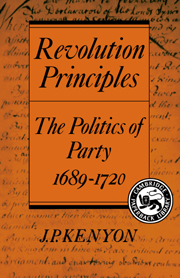Book contents
- Frontmatter
- Contents
- Preface
- Preface to the paperback edition (1990)
- 1 Introduction
- 2 By force or by miracle
- 3 The measure of submission
- 4 This skein of tangled principles
- 5 King Charles's head
- 6 The bloody flag
- 7 Revolution Principles
- 8 Black and odious colours
- 9 The four last years
- 10 That triumphant appellation
- 11 Conclusion
- Appendix
- Abbreviations
- Notes
- Addendum
- Index
- Frontmatter
- Contents
- Preface
- Preface to the paperback edition (1990)
- 1 Introduction
- 2 By force or by miracle
- 3 The measure of submission
- 4 This skein of tangled principles
- 5 King Charles's head
- 6 The bloody flag
- 7 Revolution Principles
- 8 Black and odious colours
- 9 The four last years
- 10 That triumphant appellation
- 11 Conclusion
- Appendix
- Abbreviations
- Notes
- Addendum
- Index
Summary
In retrospect it is clear that the Revolution of 1688 was as much an embarrassment to the Whigs as it was to the Tories. In theory the dogma of divine right and non-resistance still applied with all its old rigour, and the innate conservatism of the nation and the church was affirmed in such practices as the cult of Charles I. However, in terms of practical reality, after an anxious discussion in 1689 and 1690 most Tories settled down comfortably enough with the doctrine of de facto obedience to King William, a doctrine endorsed by such important luminaries as Archbishop Sharp and the Earl of Nottingham.
On their side the Whigs were convinced that the Revolution had involved in some sense the deposition of James II, but they were saddled with the unfortunate pretence of abdication, which had been adopted to enlist bipartisan support in 1689 and continued to be official government doctrine, though it is to be doubted if anyone at all sincerely believed it. Some of them fell back on a historicist view of the ancient constitution, tied to the idea of an Original Contract, itself a historical phenomenon, regularly re-appearing at the beginning of each reign; no one, including most Whigs, was ready for the idea of a notional or abstract contract of the kind adumbrated by Locke. Again, though it was easy to assume that the Revolution hinged on contract, it found no place in the Bill of Rights.
- Type
- Chapter
- Information
- Revolution PrinciplesThe Politics of Party 1689–1720, pp. 200 - 208Publisher: Cambridge University PressPrint publication year: 1977
- 1
- Cited by

